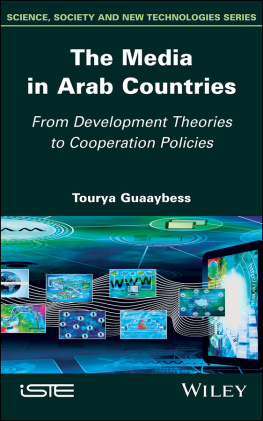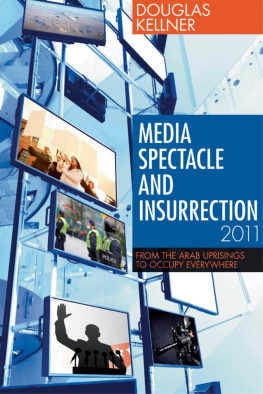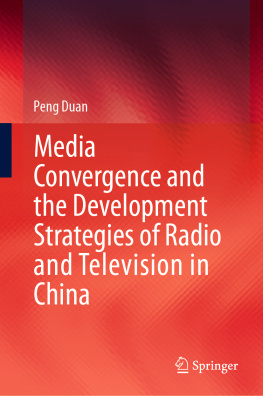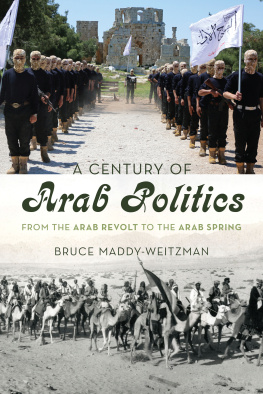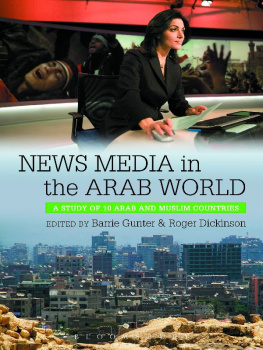
Series Editor
Fabrice Papy
The Media in Arab Countries
From Development Theories to Cooperation Policies
Tourya Guaaybess

First published 2019 in Great Britain and the United States by ISTE Ltd and John Wiley & Sons, Inc.
Apart from any fair dealing for the purposes of research or private study, or criticism or review, as permitted under the Copyright, Designs and Patents Act 1988, this publication may only be reproduced, stored or transmitted, in any form or by any means, with the prior permission in writing of the publishers, or in the case of reprographic reproduction in accordance with the terms and licenses issued by the CLA. Enquiries concerning reproduction outside these terms should be sent to the publishers at the undermentioned address:
ISTE Ltd
27-37 St Georges Road
London SW19 4EU
UK
www.iste.co.uk
John Wiley & Sons, Inc.
111 River Street
Hoboken, NJ 07030
USA
www.wiley.com
ISTE Ltd 2019
The rights of Tourya Guaaybess to be identified as the author of this work have been asserted by her in accordance with the Copyright, Designs and Patents Act 1988.
Library of Congress Control Number: 2018963506
British Library Cataloguing-in-Publication Data
A CIP record for this book is available from the British Library
ISBN 978-1-78630-401-8
Foreword
Media researchers who only read English miss out on a lot that is available in their field in French. I discovered in the mid-1990s, when first seeking literature on Egyptian and pan-Arab media, that some of the most insightful and sometimes the only up-to-date data and analysis were to be found in French sources.
Tourya Guaaybess is a pioneering French scholar who has successfully crossed language barriers and disciplinary boundaries with work in both English and French. She was already doing fieldwork on Egyptian media when we first met in Cairo in 1999 and, having maintained her cutting-edge knowledge of that specialist area in the 20 years since then, brings depth as well as breadth to her research. That vantage point now informs this timely new book addressing questions about development models envisaged for Arab media by outsiders: academics, journalists and agencies providing development assistance.
The book consequently has the advantage of drawing on both French and English perspectives on development in general and media development in particular. It refers, among others, to one of the most trenchant commentators on the very concept of development, the French author Gilbert Rist. And it does so at a moment when former orthodoxies about media and development, once espoused by Western donors of overseas aid, are now the subject of deep scepticism and doubt. For one thing, with authoritarian government spreading in the Global North as well as the South, and private media increasingly subject to control by vested interests in a process that regulators and public representatives seem unable to curb, old certainties about one-way transitions from authoritarian rule to democracy have collapsed.
Meanwhile, despite the existence today of so many online spaces for expression, Western observers still find it difficult to gauge public opinion in Arab countries, where political and cultural expression is tightly constrained. As the book argues, the problem with the notion of the Arab street, for all its apparently orientalist reductionism, lies not so much in the term itself as in the preconceptions of those who use it. Is there a suspicion, given the proliferation between 2002 and 2010 of so many new Arabic-language channels funded by non-Arab players, from the US, France and Germany to Russia, China and Turkey, that these players are basically more interested in speaking to Arab publics than listening to them? Are the changing paradigms of development aid and public diplomacy through the media leading to changes in the number and effectiveness of media interventions? If so, more or less effective for whom? These pages offer an unusually thoughtful and measured analysis of how diplomatic traditions, geopolitics and multifaceted media development objectives intersect.
Naomi SAKR
Doonan
November 2018
Introduction
The Extent, Decadence and Surge of Development Aid through the Media
Theories on development and development aid are, in principle, dependent on their fields of application and/or observation. They concern a specific field (health, land, food, etc.) and a specific geographical area. Our subject is the matter of development applied to the media and within the framework of Arab countries. These theories and scholarly recommendations have a history, and their examination is instructive in more than one way.
The construction of reality takes place in and through the relationships we maintain with one another: our descriptions, the applications of our conceptions of the world take shape within communication, and by the same token language. Attached to this position, social constructionism proposes a very rich conceptual range and opens to particularly productive practices while grasping the role of the media differently. It is a conception based on the principle that values, beliefs, institutions, customs, labels, laws, etc. are constructed by the members of a culture, through their interaction from generation to generation and from day to day. Thus, this approach conceives the world experience no longer in terms of systems but rather in terms of communicational exchanges and, therefore, mainly in terms of communicational content and stories. It is from this perspective that our work on Arab media as perceived in the countries of the Global North is situated: by both researchers and development aid agencies in Western countries.
We will see throughout this work that we have specific perceptions or constructions of realities: of development by the media in the countries of the Global South, of development by the media in Arab countries, of public opinion in Arab countries and the means to reach these audiences and to intervene in the media sector of these countries. Emphasis will be placed on the journalistic sector, which, in the wake of the Arab revolutions, is one of the preferred fields of intervention of development and cooperation agencies.
One of the main aspects of our conception of knowledge is that it emphasizes the essentially collective nature of scientific research. Every hypothesis, every knowledge and every scientific theory emerges within what Fleck calls a style of thinking. This style of thinking corresponds to the set of norms, principles, concepts and values specific to all knowledge and beliefs. It can therefore be compared to what is called a style in art or architecture, which corresponds, in the same way, to all the rules and values of a given era. This notion of thought style is inseparable from that of collective thought, which, according to Fleck, is at the origin of the norms of thought specific to the style of thought.
It is a closed and hierarchical system that takes the form of the scientific community, but which includes more broadly the whole hierarchical structure of a society. In Flecks thinking, there is the idea that each single piece of knowledge must be related not only to the body of knowledge specific to a given epoch but also to the set of institutions and practices specific to that epoch. From this point of view, to say that science is part of a collective thought process is to say that science is what we could call a total social fact (Mauss 1925). To say that Western democracies conceptions of development are part of a common framework of thought is to say that they obey a common ideology, in this case a liberal ideology.
Next page
